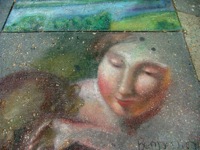Ephemeral
Origin
Greek ephēmeros lasting a day, daily, from epi- + hēmera day
Definitions
Description
Ephemeral things (from Greek εφήμερος – ephemeros, literally "lasting only one day") are transitory, existing only briefly. Typically the term is used to describe objects found in nature, although it can describe a wide range of things.
Often happiness is described as being ephemeral, as one does not find it to be a permanent state, within the scope of human lives. There are always varying shades of happiness and disappointment.
In computer networking technology, an ephemeral port is a TCP, UDP or SCTP port which is dynamically assigned to a client application for a short period of time (the duration of time the application is running). This is in contrast to the "well known" ports which are typically statically assigned to a specific application or service.
In philosophy, Denis Diderot makes use of the term "Fallacy of the Ephemeral," which refers to assumptions made outside of one's scope of time, perception, or knowledge. "...in the memory of a rose no one had ever seen a gardener die". From Diderot's Le rêve de D'Alembert.[1]
